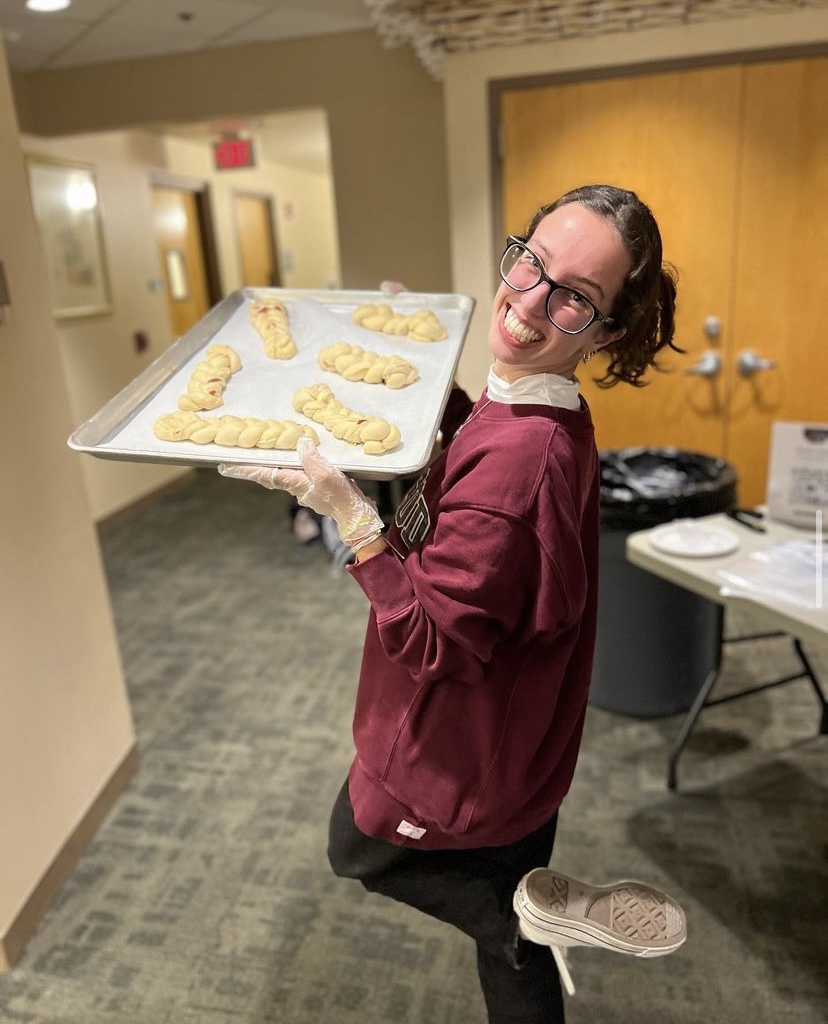Learning Wellness as a Jewish Value

College is hard, and making time to care for your health and wellness can be even harder.
I didn’t expect that some of my most eye-opening learning about mental health would come from Hillel, but this past fall, I participated in a Jewish Learning Fellowship (JLF) centered on wellness and Judaism at the University of Pittsburgh. As a double major in psychology and communication, I’ve always been interested in mental health, but this year was the first time I learned that caring for your mental health isn’t just important — it can be a way to practice your Jewish values.
Our JLF cohort was led by Emily Levine, Hillel at Pitt’s director of engagement, and Danielle Kranjec, associate vice president of Hillel International’s Center for Jewish and Israel Education/Meyerhoff Center, and focused on health and wellness from a Jewish perspective. I was really interested to understand how mental health and well-being was related to Judaism, since it wasn’t a connection I’d ever made before. I was also interested to see how the curriculum would relate to what I was learning in my psychology classes.
To my surprise, we talked about Jewish traditions and wellness in a way that was immediately applicable to our lives as college students. We learned about Shabbat and the concept of rest, about what it means to fast — or not fast — on Yom Kippur, what it means to care for a community without sacrificing our own well-being, and so much more.

Being part of this cohort at the time that I did made it even more relevant. Our group only met twice and had barely started to get to know each other before October 7. That day changed everything in so many ways, including our curriculum. Danielle and Emily shifted away from our written lessons, focusing more on discussing what was going on, how we were feeling, and what it meant to be experiencing this moment. Hillel was already working overtime to make sure we had spaces to talk or process, or even just eat and relax to get away from everything happening on campus, but this group felt more intentional and structured.
For me, as someone with a lot of close friends at school who are not Jewish, having that outlet made a huge difference. My friends were supportive of me, but they didn’t have the same perspective and personal connection to what was happening. I’ll always be grateful I had a support system where everyone was willing to talk and engage from a place of understanding, even when our perspectives or opinions were different.
One of the biggest lessons I took away from my cohort and the curriculum as a whole was the idea that taking care of yourself is part of the way we can care for our communities. I hold a number of leadership positions — it’s something I’ve always enjoyed doing, and I really love helping other people and looking out for my community. But that often means I’m stretched and at capacity, to the point where my friends will actually take me aside and say, “Daniella, really, you need to step back. You need to take a minute for yourself.”
Taking a moment for myself is easier said than done. It felt like I was abandoning my responsibilities if I put myself first. But this year, in large part due to the JLF well-being curriculum, I started to understand that by taking some time to care for myself, I was actually putting myself into a better position to support my communities and lead by example.
I decided to start small, by taking Sunday nights for myself. Instead of doing work or studying, I focused on activities that were restful and restorative, like finding moments of peace for myself amid all the chaos. I think of it as a sort of personal Shabbat — it’s not a full rest day, but it’s a time each week when I say to myself, okay, this is just for me.
And I’ve already noticed a difference. When Monday rolls around, I can actually accomplish what I need to do. I can talk to people and not be frustrated with them. I’m in a better headspace, just from taking that time to put my mental well-being first.
Mental health is something that impacts everyone, in different ways. Because of the Jewish Learning Fellowship, I’m going into my senior year with the idea that not only is it important for me to take time for self-care, but that it’s also a way to live my Jewish values, which makes it so much more meaningful for me. Knowing that taking care of ourselves is part of our tradition makes all the difference. I’m able to take what I learned and bring it into my everyday life to be a better leader on campus.
And most importantly, I’m able to see that taking time for myself isn’t slacking off — it’s part of my Jewish identity, and a meaningful way of being Jewish in the world.
Daniella Cooper is a rising senior at the University of Pittsburgh, where she studies psychology and communications. She spent the past two years on board Challah for Change and is currently serving as the president of the Panhellenic Council.
Students at 54 campus Hillels across North America participated this year in their Hillel’s Jewish Learning Fellowship’s (JLF) program “Ancient Wisdom for Modern Wellbeing,” an experiential, conversational 10-week seminar.